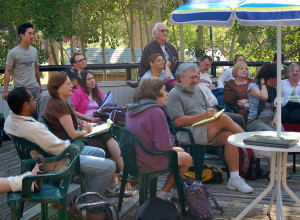John 6:56-69 – The 13th Sunday after Pentecost – for Sunday, August 23, 2015
“Many of his disciples who heard this said, “This message is harsh. Who can hear it?” (John 6:60)
 A hand waved from the back of the room.
A hand waved from the back of the room.
Then came the question: “Do you have ‘anyone’ in the room with you when you write?”
The quotation marks hugging “anyone” are important. The questioner was referring to an imagined real person.
Ron Carlson answered with, “Oh, yes I—”
In a moment I’ll finish Carlson’s response.
A few years ago, for an August week, I lived in Squaw Valley USA, the site of the 1960 Winter Olympics. Perched at 6,200 feet near Lake Tahoe, this Sierra slice of heaven is also many slices of commercialism. In winter, skiers flock here. Fancy restaurants, a golf course, luxury hotels, and mansion-like cabins dot the landscape.

Since the summer of 1969 it has hosted the Squaw Valley Community of Writers, a group dedicated to encouraging the written word. Here, under Squaw’s surrounding peaks like Granite Chief and Snow King, poets, screenwriters, memoirists, and novelists have gathered. During one year, I joined them. The “ticket” for entry is having your writing reviewed and approved by the leadership team. The published mingle with the unpublished. Experienced authors inspire fledgling writers. Amy Tan (of The Joy Luck Club fame) is a regular, first attending before her success. Alan Cheuse, author and longtime book reviewer for NPR (and who sadly died this summer), was a Squaw fixture. Ron Carlson—who responded to the question above—led workshops. Though not as high profile as Tan or Cheuse, Carlson’s short stories have garnered numerous awards. And I dare you to read his Five Skies and not admire the novel’s evocative, simple (but not simplistic) story.
It was a week filled with exhaustion, learning, and intimidation. Everyone seemed a better writer than me. What did old Apostle Paul claim about his “ranking” with the other disciples: I was the least of them (I Corinthians 15:9). Yeah, that was me at Squaw.
During a Q&A session with short story writers, the hand I mentioned waved and the question was asked . . .
“Do you have ‘anyone’ in the room with you when you write?”
In other words, when a writer glares at the blank screen or empty square of paper, is there an imagined person—a deceased parent, a rival, a mentor, or a particular reader—the writer longs to please? The writer is always the first audience. But writers want readers; people who’ll turn your pages until they reach your end.
Ron Carlson grasped the microphone and answered:
“Oh yes! Every time I write, Mr. Doubt is there. That’s the cranky fellow I write to. He’s been there since my career started. Mr. Doubt’s a big guy, and sits close. I used to hope he’d leave, but now I welcome him. But I tell him he has to stay for the whole thing, from a story’s start to its finish.”
We writers laughed. Nervously.
Carlson grinned. “Sometimes I ask him about that silent second ‘b’ in his name. Gotta let Mr. Doubt know you can get under his skin.”
More laughter.
The Five Skies author spoke the truth about writing and, at least for me, about my faith. Ernest Hemingway usually left an incomplete sentence when he stopped writing for the day. The Nobel Prize winner feared he’d have nothing to say tomorrow, but knew he had a shot at finishing one sentence. How could he doubt himself? Moses, invited by God Almighty at the burning bush to lead the Israelites from captivity, hemmed and hawed. How could he doubt himself?
Welcome in Mr. Doubt. Does the big fellow ever bid farewell?
In John’s Gospel, where Jesus spoke of the “bread that came down from heaven,” every word seems scribed without a smidgen of doubt. Still—and it’s my failing—I read between the lines. I doubt the “best-selling” author of John’s Gospel shut the door on doubt. After all, a feeble faith is oft anxious when entering a (real or metaphoric) narrow gate along a steep road. The fruit on that forbidden tree in Eden’s center forever seduces the person with a fickle faith. A fearful faith scuttled away with the disciples after Jesus’ arrest. Always, Mr. Doubt arrives to tip his jaunty hat.
And yet, I still revel in Jesus’ promise: “The words I have spoken to you are spirit and life.” Isn’t that what the best words do? Inspire! Enliven! Yes! Words do that, even when Mr. Doubt chuckles. Words heal and comfort, even when Mr. Doubt clears his phlegmy throat. Words invite risk and growth, even when Mr. Doubt whispers bitter nothings in your ear.
At Squaw, I felt the least of those present. How could good writers let me in? But on one evening I joined others for a potluck dinner. Literally, we shared bread. Some were published, some not. Some I didn’t know, others I’d spent time with in workshops. We gathered around a table, a score of us, the outdoor picnic chairs crammed beside the formal dining room chairs, and ate. Wine glasses clinked. Talk ebbed and flowed. For part of the meal, for I’m a tad shy, always the watcher, I observed others. And yes, because I so love the Jesus who propped his elbows on Capernaum tables and ate with sinners and outcasts (and probably even writers), I realized I was little different than my companions.
All are fools and foolish. All flawed. All have our essential places—a writing desk, a classroom, a kitchen, or wherever your most life-giving location and vocation may be—and soon Mr. Doubt shuffles in behind.
John’s Gospel noted that some disciples abandoned Jesus. Who said the “bread from heaven” would go down easy? But I’ll stay. Anyhow, shouldn’t following Jesus’ path be a hard choice every day?
Often, Mr. Doubt arrives. He’ll smirk, tip his jaunty hat, and bellow, “Good to see you!”
I sigh. Him again.
With or without doubt, I pray, help me to craft words to inspire and enliven.







 by
by 
















